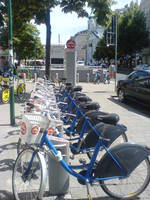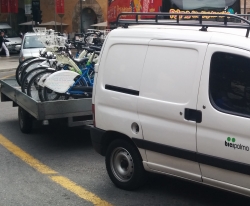In major cities, public transport is essential to cover people's need for mobility. Unfortunately, the rapid population growth and the limited land in urban areas lead to poor accessibility and reliability of traditional public transport like metro, tram, and bus. Therefore, local governments aim to enhance urban mobility with sustainable, inexpensive and flexible means of shared mobility. In this way, shared mobility systems like bike and car sharing have been launched in large cities to augment public transport. In particular, shared mobility systems provide a suitable solution for the first and last mile between points of interest and transport hubs. In addition, they contribute in reducing traffic congestion and air pollution.

Bikes receive increasing attention in city transportation, mainly because they reach areas in cities that do not have direct access to public transport. Furthermore they do not contribute to congestion or pollution of the environment. The idea of bike-sharing is to provide bikes as an individual, public means of transportation for urban population. Bike stations are distributed all over a city where bikes can be picked up and returned. Furthermore bikes do not necessarily have to be returned at the pickup station. The implementation of information systems in traditional bike renting leads to bike-sharing systems providing easy and quick city wide access. Thus, bike-sharing systems have rapidly emerged in major cities all over the world in recent years.

A common issue observed in modern bike-sharing systems is imbalance in the spatial distribution of bikes over time caused by one-way use, short hiring times of bikes and varying attractivity of stations depending on their location.
A good service level in terms of available free bike and boxes is crucial for the acceptance of bike-sharing systems. Our research deals with understanding imbalances and generating measures alleviating these bike imbalances.